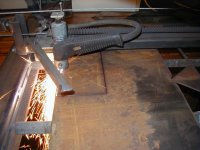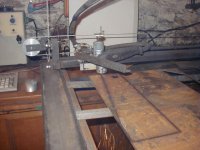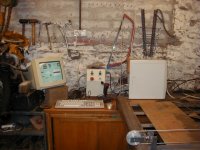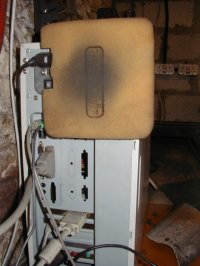

After spending some time browsing the
web and looking at how other people have built these machines I ended up
with the following specifications:
After haunting the CAD CAM EDM DRO mailing list for a while I started drawing out some plans. There were three main design problems to overcome.

This is the cutter table. The work is supported with lengths of 25mm angle iron with the points upwards. After a lot of use the angle gets quite messy and has to be replaced.
 This is a pic of the setup with monitor, control box
and PC
This is a pic of the setup with monitor, control box
and PC

After one motherboard died, presumably due to dust inhalation I turned the power supply fan around so thet the case is slightly pressurised to keep out the dust. The intake is covered with a large foam filter to catch the worst of the dust. The black mark on the filter is after one day's use!
The end result is well worth the effort. The machine will cut 2mm plate at 1.3 metres (51") a minute. The cut out parts are usually within +/- 0.5mm unless I am cutting very thin material which tends to distort badly. My next project will be a good test for the machine. (see the FrankenRover section for more details)
Back
- At least 8' by 4' as this is a standard sheet size.
- Stepper motor drive - Servos are faster and not prone to lost steps but they are also much more expensive.
- PC control. Why buy a dedicated controller when modern PCs are so powerful?
- Positional accuracy +/- 0.5mm. There is no point going better than that because heat distortion will ensure nothing comes out exactly to size anyway.
- Due to a lack of space in my workshop it must be possible to pack the machine away somehow.
- It must be constructed from low cost and easily available materials
- The rails and drive mechanism must be resistant to the vast amount of abrasive black dust that plasma cutters generate.
After haunting the CAD CAM EDM DRO mailing list for a while I started drawing out some plans. There were three main design problems to overcome.
- How to control motors to get accurate
movement
- How to convert the motor rotary motion to linear motion
- Positioning the cutter with minimum backlash

This is the cutter table. The work is supported with lengths of 25mm angle iron with the points upwards. After a lot of use the angle gets quite messy and has to be replaced.
 This is a pic of the setup with monitor, control box
and PC
This is a pic of the setup with monitor, control box
and PC
After one motherboard died, presumably due to dust inhalation I turned the power supply fan around so thet the case is slightly pressurised to keep out the dust. The intake is covered with a large foam filter to catch the worst of the dust. The black mark on the filter is after one day's use!
The end result is well worth the effort. The machine will cut 2mm plate at 1.3 metres (51") a minute. The cut out parts are usually within +/- 0.5mm unless I am cutting very thin material which tends to distort badly. My next project will be a good test for the machine. (see the FrankenRover section for more details)
Back